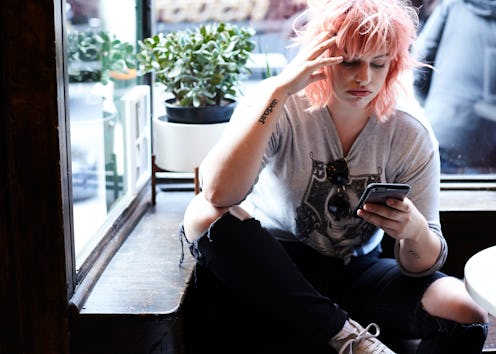Life
7 Surprising Everyday Things That Can Trigger Anxiety

Most of us get anxious when we think about things related to our future — we know that work, our family, or finding a lifelong partner can stress us out. But there are plenty of other more unsuspecting factors that can influence our mental health as well, and there are a number of everyday things that can cause anxiety you may not know about. Sometimes it's thoughts or life events that make us anxious; other times it's our little, everyday habits.
"Some of our own behaviors and things in our environment can all stimulate anxiety," therapist Laurel Steinberg, PhD, tells Bustle. "However by avoiding some of them we can make meaningful strides towards feeling as good as possible."
If you suffer from anxiety, you're not alone. Anxiety disorders are the most common mental illness in the U.S., affecting 40 million adults in the United States age 18 and older, according to the Anxiety and Depression Association of America (ADAA).
Everyone's anxiety levels vary and can be caused for different reasons, but there are common triggers that can affect us all — some of which we may not even realize. To help alleviate any anxiety you may have, experts say to minimize these surprising everyday habits as much as possible.
1The Food You Eat
Food can play a major role in your mental health, and your diet may unknowingly be causing you anxiety. "An unbalanced diet is often times an underlying factor that contributes to anxiety in many people," psychotherapist Rebecca Clegg tells Bustle. "For example, a diet without enough carbohydrates can lead to a deficiency in serotonin. Low levels of serotonin production can contribute to feelings of depression and anxiety." Therefore, it's important to pay attention to foods that can negatively affect your mental health.
2Spending Time Inside
If you're not getting outside, you might find yourself feeling more anxious than usual. "Our culture has become increasingly contained indoors," says Clegg. "We often go from our homes, to our cars, to our offices, to our cars, then back to our homes. Without the exposure to sunlight, we are finding ourselves increasingly vitamin D-deficient. This deficiency can be a contributing factor to anxiety in some people." Getting outside also boosts your levels of serotonin, the neurotransmitter responsible for your "feel-good" mood.
3Alcohol
Although alcohol is a part of celebrating and connection in our culture, it can unfortunately come with some negative side effects with regards to anxiety. "Because alcohol is a depressant that affects several neurotransmitters in the brain, it is common that people who are predisposed to anxiety may feel anxiety after consuming alcohol," says Clegg. If you find this to be an issue for you, it may be best to speak to a loved one or therapist.
4Scrolling Through Social Media
Spending too much time on Facebook or Instagram can lead to troubles internally. "With the rise of social media over the past decade, therapists have seen an increase in anxiety due to the frequency with which people are exposed to the comparison and internal judgement that is commonly reported by people who view social media platforms," says Clegg. "People tend to view the 'highlight reel' presentation of others' lives, and internalize feelings of unworthiness, failure and pressure to perform, all of which contribute to feelings of anxiety." While you don't have to avoid social media entirely, take note if browsing is bringing you down, and put your phone away for a while.
5Spending Too Much Time Alone
We could all use some quality "me" time, but spend too much time in isolation and your mental health could suffer. "Loneliness can definitely affect how anxious you are feeling, either causing you to worry about being alone or isolating yourself when you would benefit from being around others," psychotherapist Kelly Bos, MSW, RSW tells Bustle. And if this becomes a regular habit, it may be time to talk to a therapist.
6Late Nights
Staying up late can do more than just make you feel sleepy. "Regular late nights can cause sleep debt where your body is routinely not getting enough sleep to recharge itself," says Bos. "Sleep is an important time where the body repairs itself, and neglecting this causes stress on your brain and body, which can in turn lead to experiencing anxious symptoms. It also can lead to poorer processing of events and more cognitive distortions by not having a clear and rested mind."
7Other People's Anxieties
Like a bad cold, anxiety can be contagious. "Whether it’s family members, co-workers, or your own children [showing anxiety] by fast speech, constant moving, or fidgeting, we feed off of other people’s energy," "If you notice someone else’s negative energy impacting you, move away from them. Try engaging in a topic that can help distract the person, and it may actually help both of you."
Although we can't always control all our anxieties, trying to avoid these triggering things can help you feel more relaxed and anxiety-free.